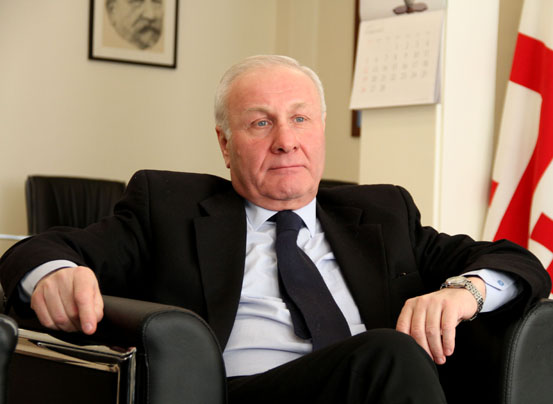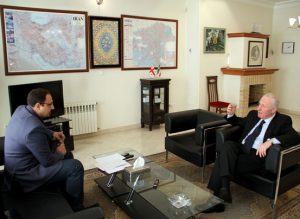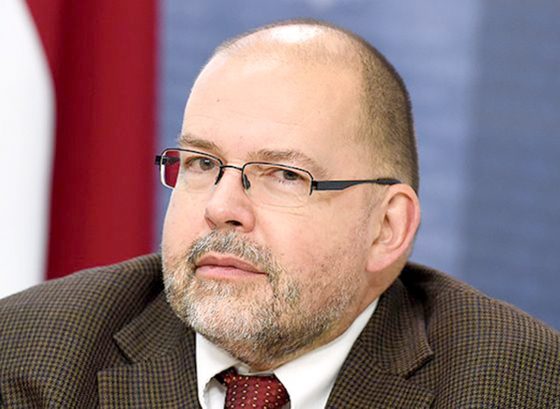“Georgia’s Prime Minister Visits Iran in Near Future,” Says Georgia’s Ambassador to Iran

Ioseb Chakhvashvili is a seasoned Georgian diplomat who has taken effective steps in expanding economic and political ties between Tehran and Tbilisi during his time in Iran. After his academic studies from 1973 to 1976, he found the chance to come to Iran to work as an interpreter at Esfahan Steel Company. He was also the representative of the Soviet specialists at the municipality of Arya Shahr (now. Foulad Shahr). Chakhvashvili continued his studies in geography and became an Assistant Professor at the Tbilisi State University and after a while, given his experience, he was invited to work at the Ministry of Foreign Affairs. Later between 1999 and 2000, he became the Director of the Department for Asia, Africa, Australia and Oceania, one of the largest departments at the Georgian Foreign Ministry at the time. Since 2000, he served for four years as a foreign policy adviser to Georgia’s former President, Mr. Shevardnadze. To know more of the trends in the economic and political developments between Iran and Georgia we carried out an interview with Ioseb Chakhvashvili which comes below.
AVA Diplomatic’s Exclusive Interview with Ioseb Chakhvashvili,
Georgia’s Ambassador to Iran
Interview by Mohammadreza Nazari
What have the economic relations between Iran and Georgia gone through after the JCPOA was achieved?
After the JCPOA, nearly 2 years ago, the necessary steps were taken and various plans came into effect for the upcoming projects to bear fruit.
At the moment, the Ghadir Project is the top plan we are putting into effect. This project is funded jointly by the two countries and is scheduled to be set up in Georgia. In fact, this plant will consist of three sections: a refinery, petrochemicals and tar production units. It is currently undergoing through the feasibility studies including geology, financial rationalization and geographical location.
The most significant aspect of this project is for its location to be close enough to Iran so that the raw materials, meaning roughly 5 million tons of crude oil, could be shipped from the Persian Gulf to the Black Sea coast at the least possible costs.
Considering Georgia’s need for tar, this product has always been supplied by Iran. Will Georgia no longer demand tar import from Iran once this project is completed?
You have a point there. As you know, Georgia does not possess crude oil and the need for tar was always there. Now the government of Georgia has decided for the internal production of tar in cooperation with Iran.
The Project, however, does not simply intend to supply Georgia’s internal needs, but is also aimed at the needs of other Black Sea countries.
 How big is the estimated investment for completing and establishing this project?
How big is the estimated investment for completing and establishing this project?
That depends on the exact details of the project and time of its implementation, but I believe at least, $3bn shall be needed. Both sides have agreed on a 50-50 % of investment in it.
Over the year that passed, we witnessed your efforts to place this project into practice, which truly invites admiration. Is there any specific implementation timeframe?
According to the estimates by the people involved in the project, the tar production section will be ready to launch in one year and the setup of the rest of it, the refinery and petrochemicals, shall take nearly 2 years. I think an overall of 3 years will be needed.
It might be interesting to our audiences to know that exporting Iranian goods through countries such as Turkmenistan shall be followed by some 15% of tariffs, while, according to the agreement between Georgia and the EU, Iranian merchants can pay zero sums of tariffs and export their products to Europe. Could you please explain this matter?
The EU-Georgia Association Agreement (AA) is an ambitious and innovative, so called “new generation” agreement as it includes the Deep and Comprehensive Free Trade Area (DC FTA) component, and envisages concrete mechanisms for approximation with the EU through gradual establishment of highest EU norms and standards. In fact, the AA envisages such high level of approximation with the EU that, in fact, its effective implementation is a significant step towards the EU integration.
The DC FTA envisages gradual economic integration of Georgia with the EU internal market, which means gaining access to the 500 million consumer market without tariffs and quotas. The DC FTA is contributing to gradual approximation with European standards in the food safety area; establishing transparent, stable business environment; increasing the attractiveness of Georgia for investments; introduction of innovative approaches and new technologies; stimulating economic growth and facilitating Georgia’s economic development.
The impact of the economic integration with the EU is particularly visible as we see trade with the EU growing since 2014 (4.3% – in 2014; 5.6% – in 2015 and 13.8% – in 2016). We already export new products to the EU market, such as kiwi and blueberries; in December 2016 Georgian honey was officially admitted to the EU market and become the first „success story“ of export of animal origin product for human consumption to the EU market; we look forward to Commission’s approval on export of fish
The aim of the Georgian government is to make the best use of opportunities opened by the DCFTA in order to boost economy, attract more investments, create better environment for local as well as international businesses, facilitate economic modernization of Georgia. We expect that these new realities will be duly seized by international business communities. We aim to create cooperation opportunities for all partners, based on principles of the rule of law, fair competition, mutual trust and respect.
In a nutshell, the Georgian products with a Georgian export certificate shall be exempt from any sort of tariffs and taxes while being exported to the EU, and in this regard, major Iranian companies can make joint investments with Georgian businessmen in Georgia and send their products to other European countries without having to pay the 15% tax.
What companies have been established using the joint investment of the two countries?
Ghadir is one of the companies, which we have already covered. Other companies are rather small-scale and active in various areas such as tile production. Iranian tile, however, enjoys global fame.
Another project is to do some work in producing 3 types of volume expanders with the help of Iran, which are not produced in Georgia. There projects run by SHASTA (Company for Social Security Investment – in Farsi “Sherkat-e Sarmayegozari-e Ta’amin-e Ejtemaei”). There are other projects, too, which we will announce in the future.
It must be mentioned that there is a vast economic potential, with a large pool of experienced engineers in the friendly country of Iran. So why shouldn’t Georgia use this opportunity? That is why we want to build another path for Iran and make use of it.
In fact, Iran has access to the World Ocean only in the south and Georgia intends to provide it with another choice. The option we have in mind is for the Georgian ports of Batumi and Poti to be offered to joint companies.
What measures have been thought of over the past recent years to develop the transportation infrastructures between Iran and Georgia?
There are excellent developments taking place in this regard. There is the Joint Commission for International Transportation Cooperation in the road, commodity and passenger areas which holds two meetings annually. Its Iranian chief is Mr. Keshavarzian, the head of the Road Maintenance and Transportation, and Mr. Atrchian, the director general of the office for transit and border terminals of Iran Road Maintenance and Transportation Organization, is the chief of road transportation of it.
These two officials have just returned from Georgia and they have both expressed their satisfaction with the meetings they have had. Along with these two Iranian officials, 4 representatives from Iranian private companies, too have visited the ports of Batumi and Poti. The main task of people like us who hold governmental positions is simply to encourage the private sector to carry out their business activities.
Would you please explain a little about the process of building and developing the railroad between Iran and Georgia?
Ground transportation is only one means of conveyance and the other would be rail transportation. As you know, Georgia’s railroad has been active since the former Soviet times.
There are two projects which we hope could bear fruit soon. First, the Republic of Azerbaijan completes the remaining railing process up to its borders with Iran and if it furthers the progress 2kms farther onto the Iranian border, it’ll make it to a rail station in Iran, which marks a considerable moment for Iranian businessmen.
The second project is Amirabad in which a bridge is designed to be built, but that still needs some $30 mn of investment to be completed.
Amirabad shall join the New Port of Alyat, which is a new port situated downside Baku. Both of these project will hugely contribute to the progress of railway transportation.
The completion of these two projects is not the end by itself of course, by building these ports and taking into account the countrywide railroad of Iran, goods can easily be transferred from north to south (Bandar Abbas) and from there to the Far Eastern countries of Japan, China and South Korea. It could also go the other way around – goods from these countries can be brought to Bandar Abbas and then, via railroads, transferred to the Black Sea and offered at the EU markets.
In this regard, it’s worth to mention that about 3 months ago, there was a meeting involving the officials of the German Federal Railroad of Deutsche Bahn. This is Europe’s biggest railroad company. Furthermore, due to its special geographic position, Germany is known to be the heart of Europe and can easily bring commodities from every side of Europe into its borders.
In the presence of the Deutsche Bahn officials, we tested the new route to Iran, shipping a container from Dusseldorf, Germany to the borders of Azerbaijan and then to Iran, which made it in 10 days.
As you know, speed and timing are two important factors in trade. We cannot dictate what route businessmen should use, but if they see for themselves the benefits of new route, they will certainly be motivated to use it.
What changes have there been in the aerial transportation after the cancellation of visas between the two countries?
According to official statistics, after the removal of visas between Iran and Georgia, the number of Iranian tourists who have travelled to Georgia has soared by 600%, which, in numbers, is estimated to be 150-200 thousand tourists per year, and we expect it to increase even more.
Despite such a significant growth, the airlines between the two countries are chartered by 4 companies (one company from Georgia and three from Iran). I think, that soon we will witness an establishment of direct, permanent flight line between our countries.
 How large has the trade between the two countries been?
How large has the trade between the two countries been?
Around $200mn.
It had reached $300mn in recent years. What has caused the drop?
Yes, it used to be $300mn, but it has decreased for a number of reasons, but we hope that with mutual efforts we will significantly increase our trade.
What factors do you deem effective in the decrease in the two countries’ trades?
We should look for the reason in the private sector, because the governments do not interfere with the economy and businessmen make their decisions based on a number of reasons. We do not intervene in their decisions and only encourage them to continue doing trade.
Cement has always been an important item for Georgia to import from Iran. How is the cement import status now?
Georgia is making progress now. We have established 5 cement factories; 3 in the eastern and 2 in the western part of Georgia. Some of these companies have established partnerships with other countries such as China. Therefore the cement import from Iran has dropped owing to the increase of Georgia’s own cement production.
Given the circumstances you referred to, has the clinker export from Iran to Georgia decreased?
That question should be addressed to the experts of the field, but when the import of clinker and cement is not, then it is a certain fact that no one imports it as the delivery of each ton of the product from Iran to Georgia shall cost nearly $90-100.
Considering Iran’s pattern of export to Georgia, new doors should be opened to extend the economic gives and takes. Has that been addressed in the joint economic commission?
Nearly 2 years ago, we convened the 5th session of the joint economic commission in Iran. I hope that in the near future, and by that, I mean in three months, the 6th joint commission will be held in Tbilisi.
From Iran, Mr. Rabi’i, Minister of Cooperatives, Labor and Social Welfare, heads the commission and from Georgia, Mr. Giorgi Kvirikashvili used to chair the meeting, but because he holds the position of the Prime Minister now, someone else will replace him in the commission soon.
How are the banking relations between the two countries?
My hope is to have no troubles in our bilateral relations in the banking sector. The policy we have adopted is to choose a bank in Iran and one in Georgia to have direct banking ties to one another. This is the first phase in the banking sector cooperation between our countries and the future relations depend on the imminent political and international circumstances.
What high-ranking delegation from Georgia will visit Iran in the near future?
We hope to witness the official visit of the Prime Minister of Georgia to Iran, but that is not scheduled yet.
How is the level of the parliamentary relations between the two countries?
We have officially invited Mr. Larijani to Georgia twice and we hope this visit will be accomplished soon. Georgia’s Speaker of the Parliament had earlier paid a visit to Iran.
The parliamentary elections were recently held in Georgia and the new Speaker of the Parliament has once again invited Mr. Larijani to visit Georgia.
We are also expecting the Chairman of the Committee for National Security and Foreign Policy of Iran’s Parliament, Mr. Boroujerdi to make an official visit to Georgia.
Along with these parliamentary visits, we are expecting for the Mayor of Tehran Mr. Ghalibaf. Earlier the Mayor of Tbilisi had made a visit to Tehran and a sister-city agreement has been signed.




